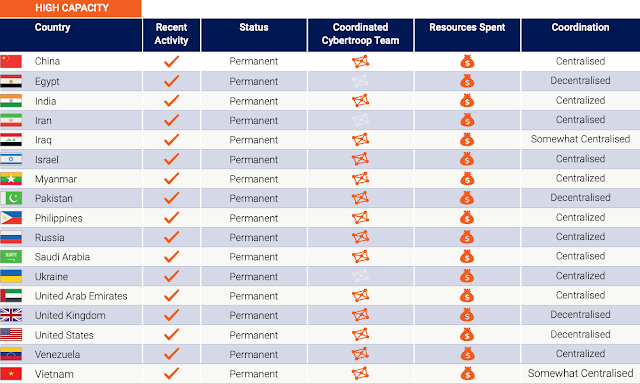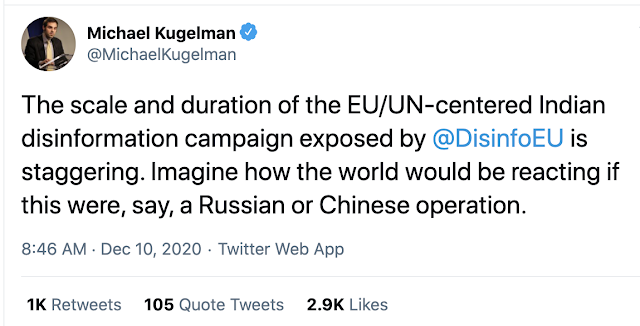PakAlumni Worldwide: The Global Social Network
Oxford University's report on global disinformation ranks India and Pakistan among top 17 "high cyber troop capacity" countries. The report defines "cyber troop capacity" in terms of numbers of people and the size of budget allocated to psychological operations or information warfare. "Cyber troop activity" as defined by the report includes social media manipulation by governments and political parties, and the various private companies and other organizations they work with to spread disinformation. Oxford report shows that India's cyber troops are "centralized" while those in Pakistan, US and UK are "decentralized". EU Disinfo Lab, an NGO that specializes in disinformation campaigns, has found that India is carrying out a massive 15-year-long disinformation campaign to hurt Pakistan.
 |
| High Cyber Capacity Countries. Source: Oxford University Disinfo Report 2020 |
High Cyber Capacity:
"High cyber troop capacity involves large numbers of staff, and large budgetary expenditure on psychological operations or information warfare. There might also be significant funds spent on research and development, as well as evidence of a multitude of techniques being used. These teams do not only operate during elections but involve full-time staff dedicated to shaping the information space. High-capacity cyber troop teams focus on foreign and domestic operations. They might also dedicate funds to state-sponsored media for overt propaganda campaigns. High-capacity teams include: Australia, China, Egypt, India, Iran, Iraq, Israel, Myanmar, Pakistan, Philippines, Russia, Saudi Arabia, Ukraine, United Arab Emirates, United Kingdom, United States, Venezuela, and Vietnam".
 |
| American Analyst Michael Kugelman's Tweet on Indian Disinformation Campaign |
Firehose of Falsehood:
What Kugelman calls "Russian Operation" appears to be a reference to a US government-funded think tank RAND Corporation's report entitled "The Russian "Firehose of Falsehood" Propaganda Model". Here is an except of the RAND report:
"Russian propaganda is produced in incredibly large volumes and is broadcast or otherwise distributed via a large number of channels. This propaganda includes text, video, audio, and still imagery propagated via the Internet, social media, satellite television, and traditional radio and television broadcasting. The producers and disseminators include a substantial force of paid Internet “trolls” who also often attack or undermine views or information that runs counter to Russian themes, doing so through online chat rooms, discussion forums, and comments sections on news and other websites".
 |
| EU Disinformation Lab Report on India's Disinformation Campaign Against Pakistan |
Indian Political Unity Against Pakistan:
Former US President Barack Obama has observed that “Expressing hostility toward Pakistan was still the quickest route to national unity (in India)”. The Indian disinformation campaign is a manifestation of Indians' political unity against Pakistan. EU Disinfo Lab has found that Indian Chronicles is a 15-year-long campaign that started in 2005 on former Prime Minister Manmohan Singh's watch, well before Prime Minister Narendra Modi's election to India's highest office in 2014. It has grown to over 750 fake media outlets covering 119 countries. There are over 750 domain names, some in the name of dead people and others using stolen identities. Here is an excerpt of EU Disinfo Lab's report:
"The creation of fake media in Brussels, Geneva and across the world and/or the repackaging and dissemination via ANI and obscure local media networks – at least in 97 countries – to multiply the repetition of online negative content about countries in conflict with India, in particular Pakistan".PTM: Lowdown on Manzoor Pashteen
East Pakistan "Genocide" Headline
Ex Indian Spy On RAW's Successes Against Pakistan
Free Speech: Myth or Reality?
Social Media Tribalism
Social Media: Blessing or Curse For Pakistan?
Planted Stories in Media
Indian BJP Troll Farm
Kulbhushan Jadhav Caught in Balochistan
The Story of Pakistan's M8 Motorway
Pakistan-China-Russia vs India-Japan-US
Riaz Haq's Youtube Channel
Riaz Haq
Video: Indian Film Festival IFFI Jury Head Calls 'Kashmir Files' "Vulgar"
Calling it "propaganda" and a "vulgar movie", Israeli filmmaker Nadav Lapid, who headed the IFFI jury, said "all of them" were "disturbed and shocked" to see the film screened at the festival.
https://www.ndtv.com/india-news/film-festival-iffi-jury-head-calls-...
New Delhi: The jury of 53rd International Film Festival in Goa has slammed the controversial movie "The Kashmir Files", which revolves around the killings and exodus of Kashmiri Pandits in 1990 from Kashmir Valley. Calling it "propaganda" and a "vulgar movie", Israeli filmmaker Nadav Lapid, who headed the IFFI jury, said "all of them" were "disturbed and shocked" to see the film screened at the festival.
"It seemed to us like a propagandist movie inappropriate for an artistic, competitive section of such a prestigious film festival. I feel totally comfortable to share openly these feelings here with you on stage. Since the spirit of having a festival is to accept also a critical discussion which is essential for art and for life," Mr Lapid said in his address.
The Anupam Kher, Mithun Chakraborty and Pallavi Joshi starrer, directed by Vivek Agnihotri, was featured in the "Panorama" section of the festival last week.
The film has been praised by the BJP and has been declared tax-free in most BJP-ruled states and was a box office hit. Prime Minister Narendra Modi and Union home minister Amit Shah have praised on the movie.
Many, however, have criticised the content, calling it a one-sided portrayal of the events that is sometimes factually incorrect and claiming the movie has a "propagandist tone".
In May, Singapore banned the movie, citing concerns over its "potential to cause enmity between different communities".
"The film will be refused classification for its provocative and one-sided portrayal of Muslims and the depictions of Hindus being persecuted in the ongoing conflict in Kashmir," read a statement from the Singapore government, reported news agency Press Trust of India.
Mr Agnihotri has alleged an "international political campaign" against him and his film by foreign media.
He claimed this was the reason his press conference was cancelled by the Foreign Correspondents Club and the Press Club of India in May.
Nov 28, 2022
Riaz Haq
Impact Of Fake News On Pakistan – OpEd
https://www.eurasiareview.com/10012023-impact-of-fake-news-on-pakis...
By Muhammad Usman Ghani
Pakistan, like the rest of the world, is facing a major threat from fake news. Access to news, political division, manipulation of social media conversations, trust in the news media, health information, and hate speech are all things that fake news has caused or spread.
According to a report by Media Matters for Democracy (MMfD), from 2015 to 2020, the number of Pakistani broadband Internet users went from 17 million to 83 million, which is almost a fourfold increase. The number of mobile broadband users grew the most. Despite a considerable digital divide—Internet penetration is less than 44% of the population—the availability of 3G and 4G mobile Internet has also led to a small but consistent growth in social media use. From 2013 on, political debates on the two biggest social media sites, Facebook and Twitter, became more popular in Pakistan. This followed a trend that was almost identical to the one seen in the United States. MMfD published that nine out of ten Pakistanis currently see disinformation as an issue, and seventy percent of the population thinks Facebook’s platform is utilized most often to propagate misinformation in the nation.
Fake news messages have significantly impacted the public’s opinion of Pakistan’s anti-polio vaccination campaign. In order to discourage parents from vaccinating their children, these misinformation tactics draw on existing vaccine scepticism and common religious or xenophobic stereotypes. In 2019, a fake video about how vaccinations affect children caused hundreds of thousands of Facebook users to interact with false anti-vaccine information. This may have been part of a chain of events that led to the suspension of the country’s anti-polio vaccination campaign. Similarly, press reports and public surveys revealed that COVID-19 misinformation campaigns caused many to believe the coronavirus was a foreign scheme, an overblown danger, or a fake. Such ideas seem to have directly affected people’s attitude about COVID-19 precautions, as seen by the public’s irresponsible behavior before the second coronavirus outbreak in Pakistan. The COVID-19 deception also caused some to avoid medical care and commit violent crimes against health personnel. People were getting the wrong idea from fake messages and conspiracy theories that doctors were working together to make more people die from the coronavirus.
“DisInfo Lab,” a non-governmental organization based in the EU, created a matrix of the Indian misinformation campaign in 2019 and 2020. This campaign relied heavily on fake news sources in social media and mainstream media to lobby international and civil society against Pakistan. Since 2005, the Indian news agency Asian News International (ANI) and the Delhi-based Shrivastava group have contributed to the creation of 256 anti-Pakistan websites that disseminate false information to 65 countries. Reports say that important parts of the larger syndicate were social organizations and humanitarian groups with ties to the United Nations (UN) and the European Union (EU). Nearly ten UNHRC-affiliated NGOs have been identified as spreading anti-Pakistan propaganda. During the campaign, Dr. Louis B. Sohn, a Harvard professor of International Humanitarian Law, took part in humanitarian conferences about the Baloch separatist movement in 2011.
This cyber misinformation effort, which lasted for over a decade, was reportedly signed in placing Pakistan on the “grey list” of the FATF, which carries accusations of funding violent extremism. Since then, Pakistan has worked hard to change the mix of false ideas about it. The current government of Pakistan has put out a detailed report on how India has lied and been dishonest in international affairs. Still, the United Nations Security Council and its important P5 members haven’t done much to deal with or stop the growing threat.
May 6, 2023
Riaz Haq
Meta’s India team delayed action against Army-led misinformation operation in Kashmir: Washington Post - The Hindu
https://www.thehindu.com/news/national/metas-india-team-delayed-act...
Facebook parent Meta’s Indian team delayed action against an organised propaganda and misinformation operation led by the Indian Army’s Chinar Corps in Jammu and Kashmir for a year, The Washington Post reported on Wednesday, citing former employees at the company. According to the report, Army officials met representatives of Twitter and Facebook and defended the operation as a counter against Pakistani misinformation networks.
The report cited members of Meta’s Coordinated Inauthentic Behavior (CIB) team for Facebook, whose brief was to flag fake profiles and networks of accounts that artificially amplified messages on the social network around the world. When the CIB flagged the Chinar Corps’s alleged operation, Meta staff in India reportedly “warned against antagonising the government of a sovereign nation over actions in territory it controls,” and expressed concern that local employees “could be imprisoned for treason,” the Post reported.
Disinformation campaign
It is unclear what the Chinar Corps’ network was posting, but the report cites “disinformation that put Kashmiri journalists in danger,” adding that many CIB employees at Facebook quit the company after Indian Meta staff stymied any pushback. The operation reportedly targeted Srinagar-based media outlet The Kashmiriyat and its editor Qazi Shibli. The Hindu has reached out to Army representatives for comment.
“As a global company, we operate in an increasingly complex regulatory environment and are focused on keeping people safe when they use our services and ensuring the safety of our employees in a manner consistent with applicable laws and human rights principles,” Meta said in a statement shared with The Hindu, adding that it prohibited coordinated inauthentic behaviour on its platforms.
This is not the first time the social media firm has been accused of allowing propaganda networks in India to go unchecked. In 2020, The Wall Street Journal reported that posts by Telangana BJP MLA T. Raja Singh calling for violence against Rohingya immigrants from Myanmar were not taken down, in spite of warnings from Meta staff in the U.S., due to pushback from Ankhi Das, Mr. Thukral’s predecessor.
Sep 27, 2023